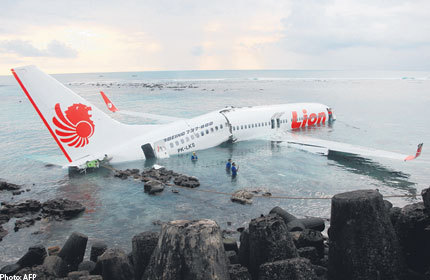
GLOBAL rules on pilots' training are not always strictly enforced, air safety experts have told The Straits Times in the wake of the recent San Francisco crash.
Not all civil aviation bodies are fully committed to upholding the regulations, they said, with some lacking the resources and others finding themselves short of expertise.
This can lead to poor oversight and varying standards among airlines - despite the rules set by the International Civil Aviation Organisation (ICAO).
"Countries generally develop their own rules and regulations and there are those which do not totally prescribe to global standards," said Mr Kevin Hiatt, president and chief executive of United States-based non-profit group the Flight Safety Foundation.
Last Saturday's Asiana Airlines Boeing 777 crash killed two teenage passengers from China and injured about 180 others.
Investigations are ongoing but one factor that has surfaced was a possible lack of pilot experience and competency.
The pilot, Mr Lee Kang Kuk, had clocked just 43 flight hours on the B-777 and was landing it for the first time at the San Francisco airport. In the cockpit with him was Mr Lee Jung Min, a trainer on his first flight as an instructor pilot. Both had years of experience but were in unfamiliar roles and flying together for the first time.
Retired US Federal Aviation Administration official Michael Daniel said it is the quality of training that matters, not the number of flying hours clocked.

The 57-year-old, who now runs a consultancy firm called Aviation Insight, said: "The aircraft came in too low, too slow and the decision to abort the landing was made during the last few seconds.
"Were the pilots properly trained for the roles they were in? Was there enough supervision in the cockpit? Did the pilots interact well together? These are key questions."
Typically, training programmes are set by airlines that work closely with their civil aviation bodies, and guided by global best practices. Singapore Airlines spokesman Nicholas Ionides said: "At all times, pilots under training are accompanied by an instructor pilot, not just for the first flight but for all flights until they pass a point where the type-rating course is deemed completed."
Leadership, communication skills and the ability to mentor others are all taken into account when picking instructors, he added.
Mr Hiatt said cockpit communication is key and many carriers have training programmes to break the barriers that rank and seniority can create.
This can be a challenge for former military pilots, for example. "If the first officer notices the captain flying too slow or fast, or did not make a turn he should have, he should not hesitate to voice his concern," said Mr Hiatt. "It cannot be a case of 'you're the leader and I should not challenge you'. In aviation, you must challenge in order that safety is not compromised."
As the probe led by the US National Transportation Safety Board continues, safety experts pointed out that proper training and adequate regulation are critical to ensure safe skies - as human error is the major cause of plane crashes.
This is especially so in the Asia-Pacific and other developing markets where strong growth in air traffic is expected to continue.
Mr Daniel said: "With new airlines being set up in these growing markets, it puts more stress on resources and the authorities who perform safety checks and oversight."
Retired Federal Aviation Administration official Jacques Astre, 55, said that while ICAO - an arm of the United Nations - sets the standards and conducts audits on civil aviation bodies, there are no serious consequences for rogue regulators.
Mr Astre, a senior consultant at The Wicks Group, said: "The bottom line is that ICAO is not an enforcement arm. It is no policeman."
But despite challenges faced by the industry, overall safety records have improved. Last year was the safest so far, said the International Air Transport Association, with one accident every five million flights.
karam@sph.com.sg

